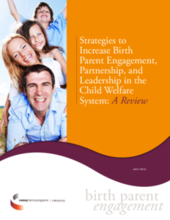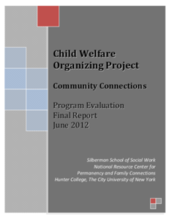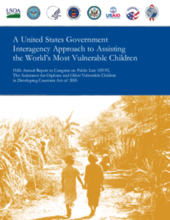This page contains documents and other resources related to children's care in the Americas. Browse resources by region, country, or category.
Displaying 501 - 510 of 566
This paper provides insight into child protection in the context of coordinated action, the architecture of U.S. government assistance, the state of evidence-base, development of appropriate research framework, practice and policy, ethical considerations, and capacity development and knowledge transfer for those advocating for children outside of family care. Recommendations are made to consider how current operational contexts, collaborative relationships and learning-knowledge can be united to focus on the various categories of children outside of family care.
Recognizing the need for evidence to inform policies, strategies, and programs to care for vulnerable children, the U.S. Government convened an Evidence Summit on Protecting Children Outside of Family Care on December 12–13, 2011, in Washington, D.C., USA. This paper summarizes the background and methods for the acquisition and evaluation of the evidence used to achieve the goals of the Summit.
As an outgrowth of Casey’s ongoing work with birth parents, Research Services and Technical Assistance Unit collaborated to review strategies and programs that increase birth parent engagement with child welfare services and that develop effective child welfare partnerships with birth parents as mentors, leaders and advisers.
Helping families and their kin develop care plans for orphaned and vulnerable children was the objective of the family group conferencing (FGC) training that took place in Guatemala City from July 10-12, 2012. This family preservation approach for developing strategies to prevent the institutionalization of children emphasizes the strengths of families and their capacity to solve their own problems and develop their own care plans.
This report from the Annie E. Casey Foundation assesses the practice of kinship care within the United States, reflecting upon the widespread use of this care practice, the complexities facing families involved in this form of care and the interventions and supports proven to assist in its success. While specific to the United States, discussions and recommendations can be assessed for application in other global settings.
This evaluation study was conducted in an effort to learn more about the innovative parent organizing model implemented by the Child Welfare Organizing Project (CWOP) in East Harlem, New York City and identify the role and impact of CWOP community representatives on birthparents, families, and child safety conference outcomes.
The Fifth Annual Report to Congress on Public Law 109-95, The Assistance for Orphans and Other Vulnerable Children in Developing Countries Act of 2005 highlights continued efforts made by the U.S. Government to improve coordination on behalf of vulnerable children in the past year.
The Deinstitutionalization Toolkit is designed to provide all those interested in institutional closures and expanded community living opportunities for people with intellectual disabilities and developmental disabilities (ID/DD) with information, strategies, state data, and case studies that can facilitate closure and build community capacity to serve more people with ID/DD in the community. It covers topics such as building a broad-based coalition, understanding and working within the political environment, creating a community system of care, and relevant laws, policies, and court decisions.
Foster youth in the US do not appear to be receiving many forms of help that are called for in federal law. Over one-third did not receive help they would have liked to have received. System factors play a stronger role than individual indicators of need in help receipt. Independent living services should be more widely available and better targeted.
Este informe presenta detalles de talleres para favorecer el desarrollo y adquisición de conocimientos, habilidades y destrezas para lograr una adecuada intervención psicosocial en las poblaciones afectadas por el terremoto/maremoto.







